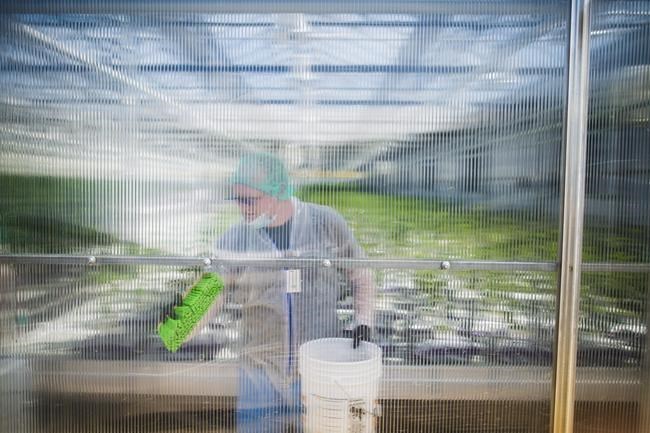
A grow technician cleans the windows of the CannTrust Niagara Greenhouse Facility during the grand opening event in Fenwick, Ont., on Tuesday, June 26, 2018. CannTrust Holdings Inc. shares are spiking as much as 20 per cent as investors take in news that the cannabis company's chief executive officer has been fired amid an ongoing investigation into allegations it was illegally growing marijuana in unauthorized rooms. THE CANADIAN PRESS/ Tijana Martin
Republished July 26, 2019 - 2:04 PM
Original Publication Date July 26, 2019 - 7:16 AM
VAUGHAN, Ont. - CannTrust Holdings Inc. shares jumped as much as 20 per cent Friday as investors reacted positively to the cannabis company's move to fire its chief executive officer "with cause" and force its board chair to resign amid an ongoing investigation into allegations it was growing pot without government authorization.
Stock in the beleaguered company, based in Vaughan, Ont. rose as high as $3.15 per share in morning trading on the Toronto Stock Exchange, but closed at $3.01.
Still, even with the nearly 17 per cent increase, the cannabis company's shares are down more than 50 per cent since CannTrust disclosed on July 8 Health Canada's finding that it was growing pot in at its Southern Ontario greenhouse before getting the appropriate licences to do so.
Late Thursday, CannTrust announced that it had terminated chief executive Peter Aceto and demanded the resignation of the company's chair Eric Paul, who promptly stepped down.
"The investigation into the Company's non-compliance with Health Canada regulations and ancillary matters uncovered new information that has resulted in a determination by the Board to terminate with cause," CannTrust said in a statement.
Aceto, the former president and CEO of Tangerine Bank, was appointed to the top job at the cannabis producer in October 2018, taking over for Paul at the helm.
The management shakeup came after several media reports cited internal documents and emails that suggested Paul and Aceto were aware of pot cultivation in rooms at a Pelham, Ont., facility without government approval months before Health Canada discovered the illicit activity.
CannTrust earlier this month had voluntarily halted all sales and shipments of its cannabis products as Health Canada continued its investigation, and its own special committee of board directors also examined what transpired.
As part of the overhaul announced late Thursday, the board appointed the special committee's chair Robert Marcovitch as interim CEO, and he will no longer be a member of the committee as a result.
"Our first priority is to complete the remaining items of our investigation and bring the company's operations into full regulatory compliance," Marcovitch said in a statement.
The role of special committee chair will be assumed by Mark Dawber, another board member.
Health Canada discovered during an unannounced inspection in June that the pot firm was growing cannabis in several rooms before securing appropriate licences, and has said that the company provided false and misleading information to its inspectors. Nick Lalonde, a former CannTrust employee, has said he was asked to put up fake walls to conceal unlicensed plants at the Ontario greenhouse in photos which were sent to Health Canada.
CannTrust said the unlicensed growing took place between October 2018 and March 2019, before the licences were issued for the five rooms in April 2019. There are a total of 12 rooms at CannTrust's Pelham, Ont. greenhouse facility.
Health Canada has put on hold roughly 5,200 kilograms from the unlicensed room and CannTrust has voluntarily put on hold another 7,500 kilograms linked to the rooms, which in total is more than the cannabis company produced all quarter. The regulator said it is testing samples of the product seized at CannTrust's facility at its laboratories.
CannTrust on July 17 submitted its official response to Health Canada's findings, and the Ottawa-based agency said it will "thoroughly review the information submitted and will take it into account in its decision making process."
There are a number of enforcement tools Health Canada can use under the Cannabis Act, which include the suspension or cancellation of a federal licence or the issuance of administrative monetary penalties up to $1 million.
Cultivation, sales and exporting of cannabis unless authorized under the Act are criminal activities, the penalties for which range from fines to imprisonment for up to 14 years.
News from © The Canadian Press, 2019